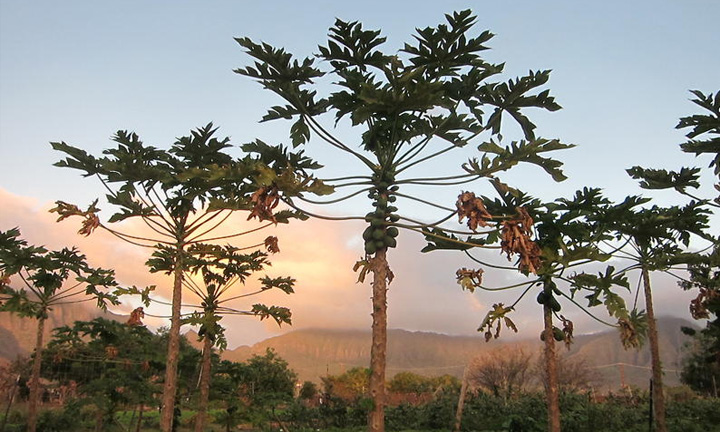SOURCE: Ryan Finnerty, Hawaii Public Radio
With hotels, restaurants, and farmers largely shuttered, demand for fresh, local produce has plummeted. The loss of revenue puts future harvests at risk.
Local farmers are experiencing a cash crunch, according to Brian Miyamoto, director of the Hawaii Farm Bureau. He says a wide range of crops of have seen a decline in sales due to the economic shutdown.
“Aquaculture, mac nuts, coffee, herbs, papaya, and pineapple are highly dependent on tourism, the food service industry, and the export market. Many of them have hit some really tough times,” Miyamoto said in a briefing to lawmakers in the state House of Representatives.
The closure of hotels, restaurants, and retail shops, has caused major markets for Hawaii-grown produce to dry up. Miyamoto says sales are down 40 to 50 percent for the state’s large farms. As an example, he cited 200,000 pounds of papaya on Hawaii Island that do not have a buyer.
That loss of revenue now will have a lasting impact on local farmers, who use the current year’s proceeds to fund investments for future harvests.
“If they don’t have an income, they cannot purchase seeds, water, fuel for their tractors, pay their leases, pay their labor, Miyamoto said. “Our farmers need capital now.”
The Hawaii Farm Bureau is asking the state to reopen shuttered farmers markets, increase purchases of locally grown crops by public institutions, and provide cash subsidies to growers impacted by the shutdown.
Under its multi-trillion dollar rescue package, U.S. Congress provided the USDA with $9.5 billion to assist struggling farmers impacted by the COVID-19 pandemic. Miyamoto says local producers still don’t know when that money will be available or who will qualify.
“It is getting critical,” he said.
Hawaii has more than 7,000 farms that produce over $500 million worth of crops. The state is the leading U.S. producer of macadamia nuts, coffee, pineapple, and papaya.

